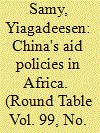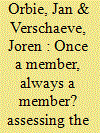| Srl | Item |
| 1 |
ID:
093954


|
|
|
|
|
| Publication |
2010.
|
| Summary/Abstract |
Since the Beijing Summit of the Forum on China-Africa Co-operation in 2006, China's renewed interest in Africa has garnered a lot of attention and generated a lot of debate. Western media and analysts have, perhaps not surprisingly, been generally very critical of China's rising influence in Africa. The African reaction, however, has been more mixed. African leaders have welcomed what they see as a new approach to development and increased potential for meaningful South-South co-operation. African civil society groups have been more cautious and are worried about the possible negative repercussions on governance, the environment, human rights and overall economic development. This paper focuses on Chinese foreign aid to Africa and discusses the opportunities and challenges that it presents for China, the African continent, and the international community. This allows the uncovering of many misconceptions regarding the potential impact (whether positive or negative) of this renewed interest by different parties. The paper argues that if one adopts an approach that puts ordinary Africans first, at the centre of development, then the only option available to us is to engage China in a constructive partnership in order to make its aid effective.
|
|
|
|
|
|
|
|
|
|
|
|
|
|
|
|
| 2 |
ID:
147962


|
|
|
|
|
| Summary/Abstract |
This article examines the European Union's (EU's) full membership of the Development Assistance Committee (DAC) of the Organisation for Economic Co-operation and Development (OECD). More specifically, we address (1) why the EU became a full member of the DAC in 1961, long before the EU was granted legal competences for development policy, and (2) why this membership status has remained unaltered over the past half-century, despite persistent dissatisfaction among both EU and non-EU members of the DAC. By applying historical institutionalism, we find that the initial decision on the EU's membership status in the DAC created a path dependence that was impossible to reverse afterwards, despite changing internal and external circumstances.
|
|
|
|
|
|
|
|
|
|
|
|
|
|
|
|
| 3 |
ID:
139006


|
|
|
|
|
| Summary/Abstract |
The revival of China's interest in Africa is often highlighted as being an opportunity to provide African governments with a choice between development partners that may strengthen negotiation leverage and thereby carve out policy space to define and implement policies that affect social and economic development. This article critically reviews the most recent developments in Chinese and Organisation for Economic Cooperation and Development (OECD) approaches to development finance to Africa. It argues that although we can detect a number of incidents that point towards more policy space for African governments, the revival of China's development finance does not fundamentally alter the power relations between African countries and their financiers, as the tendency now is towards convergence and cooperation between China and Development Assistance Committee (DAC) donors—not divergence and competition, which could have created policy space as it did prior to the end of the Cold War. This follows the trend of other ‘emerging’ donors who increasingly play by DAC rules and thereby minimize the future possibility of playing out one partner against the other.
|
|
|
|
|
|
|
|
|
|
|
|
|
|
|
|